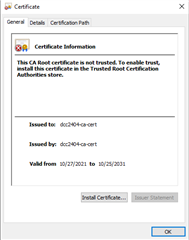Other Parts Discussed in Thread: CC3235SF, UNIFLASH, CC3220SF
Dear team,
I want to generate our companies own production code signing certificate for the CC3235MODSF. SWUP332A describes the way to generate a private key and a Certificate Signing request file.
I have have generated these two files. The problem is now that I do not find a CA which generates a complete chain of trust for a RSA key lenght of 2048. They are only issuing certificates for a key length of 3072 and 4096.
Does the CC3235 supports certificates with longer RSA keys?
Regards
Ulrich


